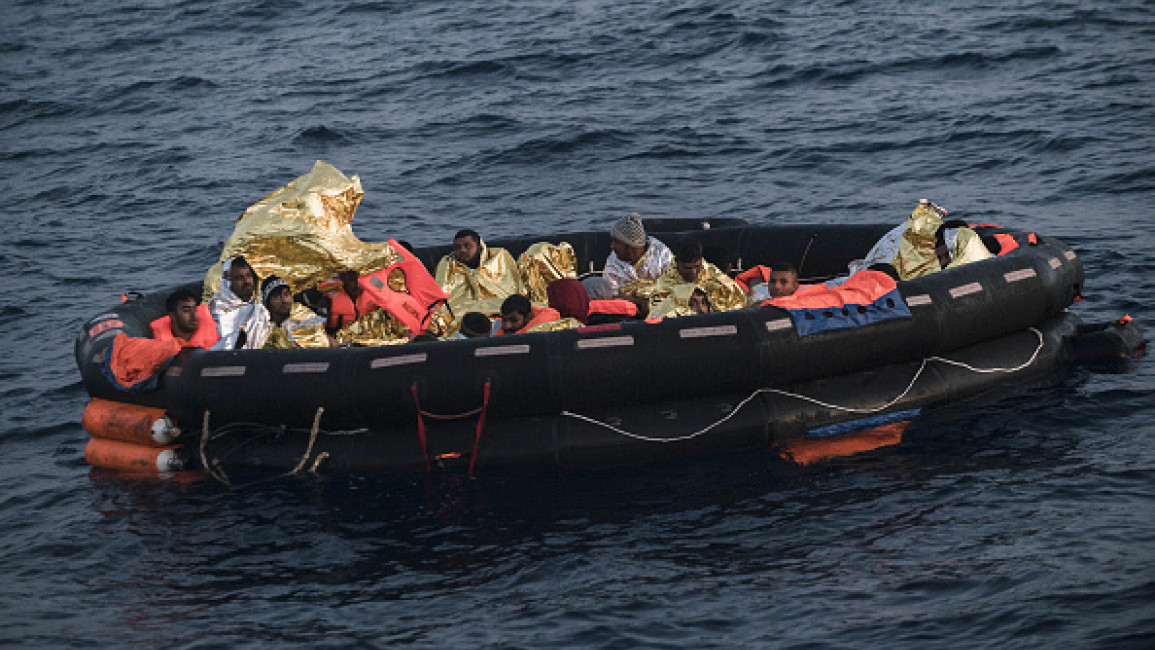Relatives of missing migrants protest in Rabat, demanding any information
Holding on to her brother's picture, and repeating the story of his disappearance to each journalist while in tears, Amina, a woman in her forties, travelled dozens of kilometres from Khenifra (northern central) to Rabat to protest the unfair fate of her brother.
Two years ago, Hassan bid farewell to his mother and young daughter in Khenifra after he decided to cross to Europe through the Atlantic route, one of the deadliest in the world.
"He wanted to go to afford medication for our sick mother and a better income for his family," Amna told The New Arab.
On 28 December 2020, the thirty-year-old man spoke for the last time with his family, informing them that he is waiting in a room with a group of migrants, ready to start their journey from Dakhla city.
In front of the headquarters of the diplomatic representation of the European Union Commission in Rabat, Amina and dozens of families with similar stories came Friday to Rabat looking for an answer to a simple question: are their relatives still alive?
"I just want to know if he is dead or alive," said Amina as she broke into tears.
The families also renewed their demands for a DNA test to reveal the identity of bodies in morgues in Nador and Algeria, as well as facilitate the granting of visas for the concerned families to go look for their relatives.
In a memorandum addressed to the Ambassador of the European Union in Rabat, "the Association Aiding Migrants in Difficult Situations" called on the European Union countries, Moroccan authorities and concerned Maghreb countries to disclose the fate of the missing youths and bear responsibility for publishing their lists and places of detention.
Mohammed, a Moroccan father, has been looking for his only son Amin for three years now after he was arrested in Libya.
"He went to Libya to cross from there to Europe. He was already a talented craftsman in Morocco but he wanted a better life," Mohammed told the TNA.
Amin called his father last time on 24 September 2020 to inform him that he was arrested in Libya.
Since then his father could not reach him. "Some Moroccans who were arrested with him told me he is still alive when they left were released," Mohammed told the TNA.
In 2021, the Euro-Mediterranean Human Rights Observatory said in a report that Libyan authorities are keeping dozens of Moroccan migrants in detention "without legal justification" under "inhuman conditions."
Last month, Moroccan Minister of Foreign Affairs, Nasser Bourita assured that "the Consulate General of Morocco in Tunis is in permanent contact with them, and passes are issued from time to time for those whom the Libyan authorities release once their Moroccan identity is confirmed."
"The treatment they receive from the Libyans is an acceptable treatment, contrary to what some social media promote," added the minister in a statement to the parliament.
In 2021, around 12,400 migrants Moroccan nationals landed by sea in mainland Spain, the Balearic and Canary archipelagos, according to official Spanish figures.
A recent UN study found that 7 out of 10 young Moroccans wish to migrate abroad, the number puts Morocco at the top of the list for the MENA region.
Unemployment, inflation and seeking more freedoms top the list of the reasons pushing young Moroccans to leave their homeland. Nearly half of the North African population is under 30-years-old.
Unemployment in Morocco affects around 12 per cent of the population but is much higher among certain demographics, including youth (31 per cent), university graduates (18.7 per cent) and women (16.5 per cent).
In January, the inflation rate in Morocco reached a new record high of 8.9%, fulling further the food and fuel crisis that struck the North African kingdom last year.



